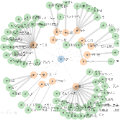In clinical practice, physicians refrain from making decisions when patient information is insufficient. This behavior, known as abstention, is a critical safety mechanism preventing potentially harmful misdiagnoses. Recent investigations have reported the application of large language models (LLMs) in medical scenarios. However, existing LLMs struggle with the abstentions, frequently providing overconfident responses despite incomplete information. This limitation stems from conventional abstention methods relying solely on model self-assessments, which lack systematic strategies to identify knowledge boundaries with external medical evidences. To address this, we propose \textbf{KnowGuard}, a novel \textit{investigate-before-abstain} paradigm that integrates systematic knowledge graph exploration for clinical decision-making. Our approach consists of two key stages operating on a shared contextualized evidence pool: 1) an evidence discovery stage that systematically explores the medical knowledge space through graph expansion and direct retrieval, and 2) an evidence evaluation stage that ranks evidence using multiple factors to adapt exploration based on patient context and conversation history. This two-stage approach enables systematic knowledge graph exploration, allowing models to trace structured reasoning paths and recognize insufficient medical evidence. We evaluate our abstention approach using open-ended multi-round clinical benchmarks that mimic realistic diagnostic scenarios, assessing abstention quality through accuracy-efficiency trade-offs beyond existing closed-form evaluations. Experimental evidences clearly demonstrate that KnowGuard outperforms state-of-the-art abstention approaches, improving diagnostic accuracy by 3.93\% while reducing unnecessary interaction by 7.27 turns on average.
翻译:暂无翻译





